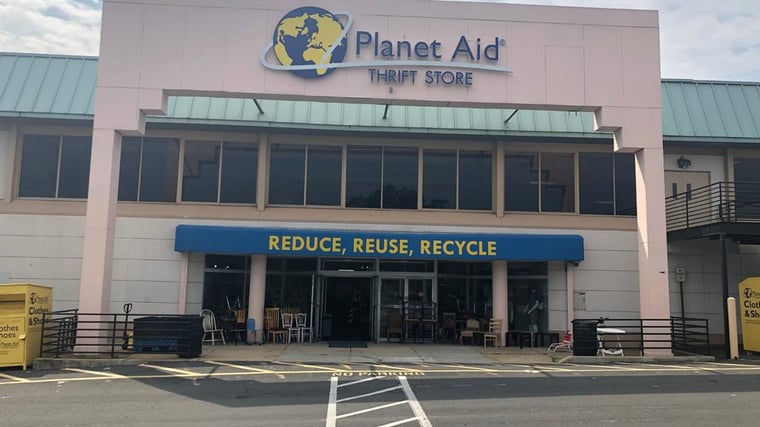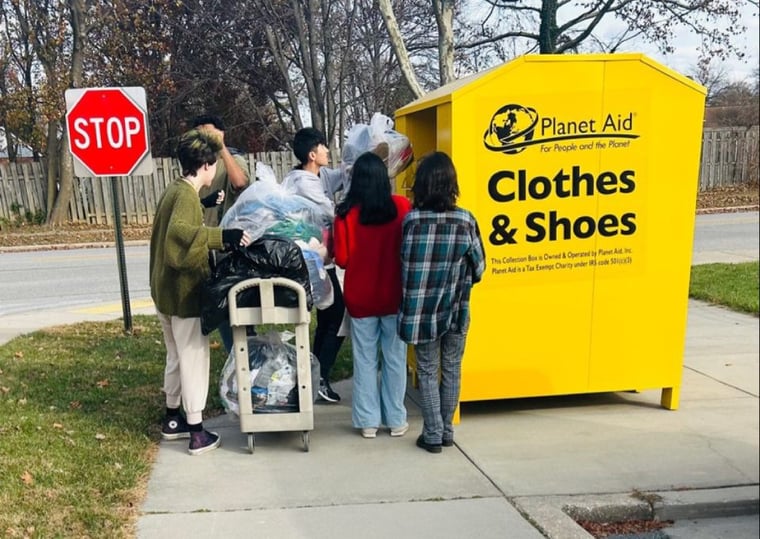.jpg?width=760&height=760&name=World-Recycling-Day%20(1).jpg)
March 18 is World Recycling Day—a day to raise awareness about the importance of recycling. Recycling plays a crucial role in preserving the environment by reducing waste and conserving precious resources like clean water that used to manufacture new products.
For over 25 years, Planet Aid has collected old, unused, or wanted textiles to keep them out of U.S. landfills and give them a second life. Many textiles, like clothing, fabric, and shoes, often end up in U.S. landfills. The National Institute of Standards and Technology (NIST) estimated that only about 15% of used clothes and other textiles in the U.S. get reused or recycled. The other 85% end up in landfills or incinerated. On average, each person in the U.S. discarded roughly 103 pounds of textiles in 2018, according to NIST.
By recycling or reusing textiles, we can significantly decrease the amount of waste that ends up in landfills and reduce the need for new raw materials, thus lowering the carbon footprint of the fashion industry.
Reuse Before You Recycle
Recycling is often used as an all-inclusive term that includes "reuse," but recycling refers to the process of converting waste materials into new products to prevent waste of potentially useful materials.
Reuse involves using an item again for its original, or a different purpose without significantly altering its form. Ideally, a product is reused until it can't be reused any more. Then it is recycled. Clothes and other textiles that are too old or worn can still have an afterlife in other products. For example, they can be cut and resold by industrial rag manufacturers. The fibers can also be separated and recycled back into new textiles or used as stuffing for upholstered furniture and car seats or home insulation material.
While recycling often requires materials to be broken down and reprocessed into new products, reuse gives the item a second (or third) life without the need for extensive processing. Both practices play a crucial role in reducing waste, conserving resources, and promoting sustainability. By incorporating reuse and recycling into our daily lives, we can help minimize our environmental impact and contribute to a more sustainable future.

In the United States, recycling efforts have been making progress, with more people becoming aware of the importance of recycling. According to recent statistics from the EPA, the recycling rate in the U.S. has been steadily increasing, with about 32% of waste being recycled. The goal is to reach 50% by 2050. Compared to some other countries, the U.S. still has room for improvement. Countries like Germany and Austria have recycling rates upwards of 60%, showcasing the potential for further growth in recycling efforts.
Planet Aid has made significant contributions to recycling efforts in the United States and the circular economy worldwide. According to recent statistics, Planet Aid has facilitated the recycling of between 60 to 80 million pounds of textiles annually, roughly 1.8 billion pounds over 25 years. These efforts have diverted a substantial amount of waste from landfills and has also reduced the need for valuable resources like water and cotton. Additionally, Planet Aid's initiatives have helped support local communities by creating jobs in the recycling sector and promoting sustainable practices.

On a global scale, Planet Aid's impact on the circular economy is equally impressive. By collecting then reselling textiles to be reused, Planet Aid helps fuel a second hand clothing industry that provides a livelihood for millions of people.
Through partnerships with various stakeholders, Planet Aid has been able to promote a more sustainable approach to consumption and production, contributing to the shift towards a circular economy model. Overall, Planet Aid's commitment to recycling and sustainability has not only benefitted the environment but has also fostered a greater awareness of the importance of resource conservation, environmental stewardship, and responsible waste management.

.jpg?width=760&height=570&name=thrift-store-2024%20(1).jpg)